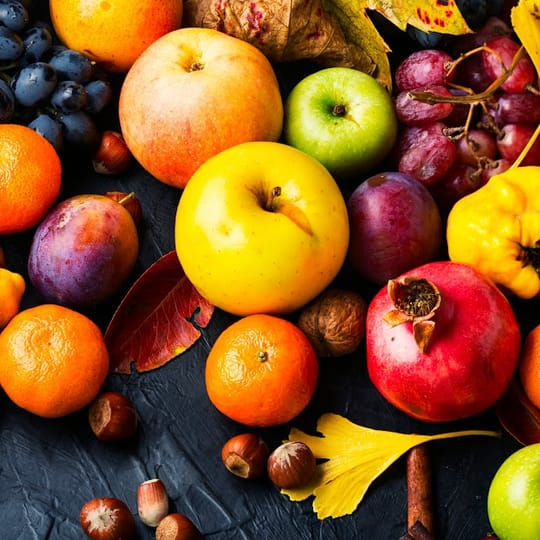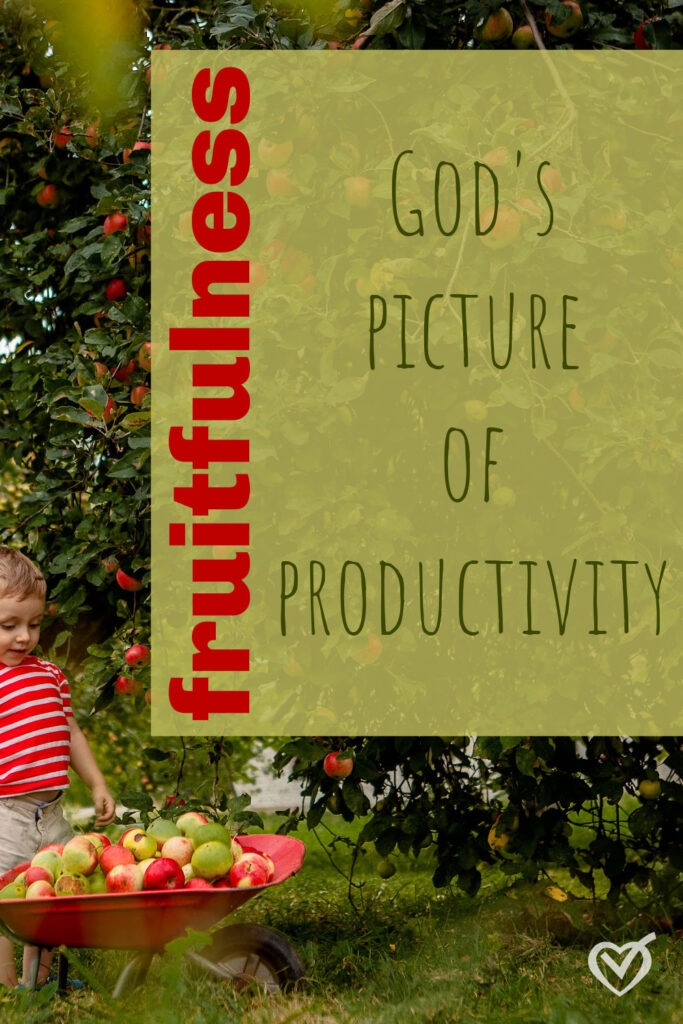
A Fruitful Life: God’s picture of productivity
Success as a homemaker is not about perfection but about faithfulness. Fruitfulness grows over time through patience and perseverance in the daily work God gives us.
It is easy and oh-so-common to feel unsuccessful as a homemaker and mother. We start out with such high hopes and grand plans, only to be crushed by the weight of the daily reality of mundane duties.
This is all the more true if we’ve bought into the magazine version of a successful, beautiful, organized home.
But what if the purpose of our homemaking was not to have an organized house that is always clean, but to be a means of abounding in the work of the Lord.
We feel defeated again, because again our picture is unreasonable. We imagine great works of charity and mercy that don’t seem to quite fit our humdrum days.
Switch metaphors. Align your imagination. The metaphor God uses for the good works he has called us to is fruitfulness.
Fruitfulness as a metaphor directs not only our motivation and productivity, but also our attitudes. Not every piece of fruit on a tree has to be amazing for the tree to be productive and plentiful. Even some of the good fruit falls to the ground and is uneaten – to our eyes, but this is one way God provides food for the birds and other lesser creatures.
When we are the fruitful tree, we don’t have to be the harvester and warehouser and chef, concerned about how the fruit is used after it is produced. We aren’t more fruitful if more of our fruit is used to make pies than juice.
God is the harvester, field manager, and chef. We are his orchard.
So let’s just use patience as an example through which to explore the what and how of fruitfulness in our lives. Each of the other fruits of the Spirit – love, joy, peace, kindness, gentleness, faithfulness, and self-control – could be substituted, but there’s no denying that patience is the need of the hour in the life of a mom.
Fruitfulness is not the same as success or accomplishment
When I was a young wife and mother I read all the organization books, the productivity books, the godly family living books. I learned a lot, and a lot of it was good. But it took me about 10 years of trying to put it into practice that I finally realized I was never going to achieve what I had assumed I would achieve if I learned the right habits (ha – and did them all the time – ha) and set up my house and housekeeping systematically.
After a few months of existential crisis (almost entirely in my own head because I am an introverted intuitive) and arguing about why housework was entirely pointless, I came to the end of my argumentative rope.
I finally bent the knee and said, “Ok, fine. If this is really the way you’ve set it up, I’ll go with it. I’m just missing something and you’ve got it figured out and I don’t. I’ll just do the work and never achieve anything by it if that’s your plan.”
Guess what? After repentance, comes rejoicing.
Giving up our own ideas of what we’re doing, what we’re about, what we’re achieving is often the first step to seeing real organization: organization that begins in the heart, having a heart rightly ordered to our Creator and Lord.
The blessed state is the state of repentance and obedience, from which rejoicing and gratitude flow.
The siren call of organization is that if we just get our act together, then we can make our life go our way, we can make our life easy on ourselves, we can be control.
It’s a lie. Real, true, God-honoring organization is being always ready to serve as needed. Being always ready is first an attitude, a mindset, a heart thing and secondarily a preparedness with the material resources we use in service.
The Nature of Fruitfulness
As I drove back home after dropping off the older kids at swim team, I thought about how good it was for them to have to get up and go do something they didn’t feel like doing in the moment because they committed to it and because in the end they do like it. When I got home, it hit me: If that’s a good thing, then I need to also. That day was supposed to be a run day on my plan, but I didn’t want to. I did want the fruit of having run – the extra energy, the expanded lungs, the stronger muscles – but I didn’t want to do the running.
It’s so annoying when parenting “backfires” and applies to us. But it turns out we need character training just as much (or more) than our kids. It is good for us to get up – not only in the morning but at any point from our chairs during the day also – and do something worthwhile when we don’t feel like it in the moment.
We often think of needing patience only when we are tempted toward anger and frustration, but we also need patience for the work that pays off at a later date. Patience is a part of perseverance, and it is grown by practicing it, by doing the work that is less pleasant at the time, but will later yield abundantly.
Fruit on a tree doesn’t appear overnight. It grows over time and then still must ripen. So to our fruit isn’t instantaneous in its development or in its worthiness.
Patience buds and develops when toddlers are spilling milk and breaking dishes and then walking through the mess, unaware. Patience keeps at table manners and good habits for years after we thought we’d get the payoff of “smooth and easy days.” Patience doesn’t look for a fully ripened fruit before its time. It is willing to stick out the long growing season and not doubt that the ripening and harvest will come.
Every act of patience is a drop of sap growing our fruit. The fruit of the Spirit is the fruit we are growing. Our children are baby trees of their own, not the fruit on our tree. We’re in the same orchard together, but the fruit we must be looking to increase is the fruit of the Spirit within our own lives.
The consequences of growing those fruit will be the discipleship of our children in doing the same, but we can’t disciple them in fruit we ourselves aren’t growing.
Fruitfulness is abundance beyond measure
We tend to think of productivity as being a laser-focused, outcome-based high achievement ability.
Fruitfulness shifts the imagery and therefore the expectations.
A fruitful tree is messy. It has abundance growing every which way. Every direction, branches reach outward.
A fruitful tree is stationary, yet has growth and movement.
Typical modern productivity imagery feel more like a freight train, powering forward unilaterally and productivity is the speed at which it is able to reach its destination.
Fruit is seasonal. Fruitfulness has no destination it will reach and stop at. Fruit trees require continual sunshine, pruning, fertilizer, water, and growth. It is the same with us.
We don’t power through so we can get to where we want to be, when we’ll suddenly stop and achieve our goal – like a freight train. We also don’t just chug along like trains who have the right amount fuel constantly applied.
Sometimes we feel like that’s what we’re trying to figure out. We’re trying to apply the right kind and amount of fuel so we can get constant and speedy speed along the track of our life.
However, we are like trees, not trains. All our lives we are watered and pruned by God. We never get to the point at which we don’t need to bring in new nutrients, to be watered by the Word and sacraments, to be pruned and shaped by trial and testing for the purpose of bringing more and better glory to God in our fruitful obedience. All our lives we go through season after season, of visibly ripening fruit and also dormancy.
The bulk of a tree’s productive energy goes not into harvest, but into pouring reserves into many little, stunted-looking, unripe fruit. We might want it to be all harvest, all the time, but that’s not how God has arranged reality.
He is the Lord of the harvest, and we are his garden, his trees, pouring our energies into the fruit we’ve been called to produce, even though most of the time it doesn’t look like much.
Start walking in fruitful faithfulness
Simply getting more done does not actually matter. We need to be doing the right things and focusing on what’s important, not superficial results. We don’t need to be fully functional machines, cranking out widgets; we need to be well-watered trees producing abundant harvests of mature fruit in God’s timing, not our own.
How we think about our lives and what’s on our to-do list matters. We need to reorient our thinking towards living fruitfully.
If you feel like the work you do each day is meaningless or worthless or unfulfilling, that is a problem that needs to be addressed. If it’s true, why do it? If it’s not true, how can you change your mindset, your feelings, your perspective on the work God’s given you?
Start with a brain dump, decluttering our head and getting our hearts and minds clear. Do this first step for free with the free brain dump guide.
Yes, simply writing it all down will help to
- Reduce stress by getting your thoughts onto paper
- Reduce frustration by assigning homes to stuff, tangible & intangible
- Reduce anxiety by knowing what you have on your plate





